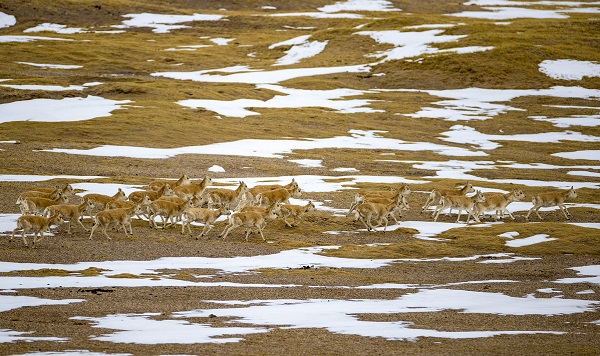Plateau's ice assets ring-fenced to ensure improved protection

This photo taken on April 17, 2023 shows Tibetan antelopes at the Qiangtang National Nature Reserve in the northern part of Southwest China's Tibet autonomous region. [Photo/Xinhua]
Plans have been drawn up to improve the protection of snowcapped mountains, glaciers and frozen soil on the Qinghai-Tibet Plateau, according to a draft law on ecological conservation in the region.
The draft was submitted to an ongoing session of the Standing Committee of the National People's Congress for third reading on Monday.
After the first reading in August and second reading in December, the Constitution and Law Committee of the NPC convened two meetings this month to further mull over the draft, said Cong Bin, an official with the committee.
Some legislators, government bodies, experts and the public have suggested ramping up the conservation of the ecosystem and environment on the plateau and the control of ecological risks by highlighting the protection of snow-capped mountains, glaciers and frozen soil in the law, he said.
Based on these suggestions, more clauses have been included in the law, he continued.
The draft law, for example, rules that special institutions should be established to protect these resources, and effective measures will be introduced in some key snowcapped mountains and glaciers to rigidly restrict disturbances from people.
He said measures will also be taken to synergize the protection of these resources and the ecosystems around them, so that a natural environment that favors the conservation of resources will be kept intact.
According to the draft law, provincial-level governments on the plateau will need to encircle all large-scale glaciers and groups of small-scale glaciers into the red line for ecological conservation. Access to key snow-capped mountains and glaciers will be banned.
These provincial-level governments should also specify the areas of frozen soil for protection, it said. Resources development should be highly restricted in areas with permafrost.
Stretching for 2.58 million square kilometers, the Qinghai-Tibet Plateau covers not only the Tibet autonomous region and Qinghai province, but also parts of the Xinjiang Uygur autonomous region and Sichuan, Gansu and Yunnan provinces. The plateau is the origin of some of the longest rivers in the world, including the Yangtze and the Yellow rivers.
The Constitution and Law Committee has adopted suggestions to increase penalties for violations on the plateau, Cong said.
Individuals who drop litter on the plateau will be fined 100 to 500 yuan ($15 to $75). For severe violations, the fine will be 500 to 10,000 yuan, he said.
He said penalties for companies that dump waste randomly will be 50,000 to 500,000 yuan.
At a news conference on Friday, Zang Tiewei, spokesman with the NPC's Legislative Affairs Commission, said the commission received 79 suggestions on the draft law from 60 people via the NPC website after the draft was submitted for second reading in December.
- Top legislature schedules standing committee session for late February
- China's top legislator meets with Uruguayan president
- Senior legislator surveys Anhui on formulating outline of provincial 15th Five-Year Plan
- China's top legislator meets with British PM
- NPC deputies see more engagement with top court



